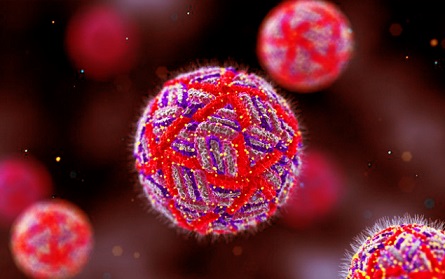Nikhil Prasad Fact checked by:Thailand Medical News Team Dec 01, 2024 5 months, 3 weeks, 1 day, 2 hours, 43 minutes ago
Medical News: Scientists from institutions across China, including Zhejiang Provincial Center for Disease Control and Prevention, Zhejiang Chinese Medical University, and Sir Run Run Shaw Hospital, have been delving into the effects of Dengue virus type 1 (DENV-1). This virus, one of the most widespread mosquito-borne pathogens, poses severe health challenges globally. Their groundbreaking research has uncovered how DENV-1 interacts with human immune cells, particularly macrophages, revealing a critical process called pyroptosis.
 How Dengue Virus Impacts Macrophages and Triggers Inflammatory Cell Death
How Dengue Virus Impacts Macrophages and Triggers Inflammatory Cell Death
Dengue fever, caused by DENV, can range from mild flu-like symptoms to severe conditions like dengue hemorrhagic fever and shock syndrome. These severe forms often lead to hospitalization and, in some cases, death. Understanding the mechanisms driving these outcomes is vital for developing targeted treatments.
What This Study Explores
This
Medical News report highlights the intricate cellular processes that occur during DENV-1 infection. The study focused on macrophages, essential immune cells tasked with defending against pathogens. When infected by DENV-1, macrophages undergo pyroptosis - a type of programmed cell death characterized by inflammation and cell rupture. This response, while part of the body's defense mechanism, can lead to severe inflammation and tissue damage when uncontrolled.
The research employed advanced techniques such as high-throughput sequencing to identify changes in microRNA (miRNA) expression profiles during infection. These tiny RNA molecules play a crucial role in regulating inflammation and cell death, making them key players in the progression of dengue-related symptoms.
How DENV-1 Affects Macrophages
Macrophages infected with DENV-1 exhibit reduced viability and increased markers of pyroptosis. The study showed:
-Activation of Inflammasomes: DENV-1 triggers the activation of the NLRP3 inflammasome, a protein complex that plays a significant role in the inflammatory response. This activation leads to the production of caspase-1, an enzyme crucial for pyroptosis.
-Membrane Disruption: Pyroptosis results in the cleavage of a protein called gasdermin D, forming pores in the cell membrane. These pores allow the release of inflammatory signals like interleukin-1β (IL-1β), exacerbating the immune response.
-Increased IL-1β Levels: IL-1β is a potent pro-inflammatory cytokine. The research found that its levels rise significantly during DENV-1 infection, correlating with increased disease severity.
The Role of MicroRNAs in Inflammation
Through sequencing, the researchers identified 63 miRNAs with altered expression during different stages of DENV-1 infection. These included miR-223-3p, miR-148a-3p, miR-125a-5p, miR-146a-5p, and miR-34a-5p. Each of th
ese miRNAs has distinct roles in regulating inflammation:
-miR-223-3p: Downregulated during infection, this miRNA is known to suppress inflammation by targeting the NLRP3 inflammasome.
-miR-34a-5p: Its expression surged during infection, contributing to inflammation and pyroptosis. Blocking miR-34a-5p could potentially mitigate these effects.
-miR-125a-5p and miR-146a-5p: Both upregulated, they are involved in immune regulation and have been linked to diseases like rheumatoid arthritis.
-miR-148a-3p: Plays roles in neuroinflammation and vascular health, suggesting its involvement in the endothelial damage seen in severe dengue cases.
Implications of the Study
These findings shed light on how DENV-1 hijacks the immune system, triggering excessive inflammation and cell death. The identification of key miRNAs opens avenues for therapeutic intervention. By targeting these molecules, it may be possible to reduce inflammation and prevent severe disease outcomes.
For instance, miR-34a-5p inhibitors could be explored as potential treatments to reduce pyroptosis. Similarly, enhancing the function of miR-223-3p might help dampen excessive immune responses.
Conclusions and Future Directions
The study offers a detailed view of how DENV-1 infection leads to pyroptosis in macrophages, driving inflammation and potentially contributing to severe dengue manifestations. The altered expression of specific miRNAs provides valuable insights into the molecular mechanisms underlying these processes.
Future research should focus on validating these findings in clinical settings and exploring the therapeutic potential of miRNA modulation. Additionally, understanding how other DENV serotypes interact with immune cells could further refine treatment strategies.
The study findings were published in the peer-reviewed journal: Biomedicines.
https://www.mdpi.com/2227-9059/12/12/2752
For the latest Dengue News, keep on logging to Thailand
Medical News.
Read Also:
https://www.thailandmedical.news/news/early-cytokine-surge-in-secondary-dengue-infections-offers-clues-for-better-diagnosis
https://www.thailandmedical.news/news/taiwanese-murine-study-shows-that-dengue-virus-envelope-protein-causes-dangerous-hemorrhage-and-endothelial-cell-death
https://www.thailandmedical.news/articles/dengue-news
